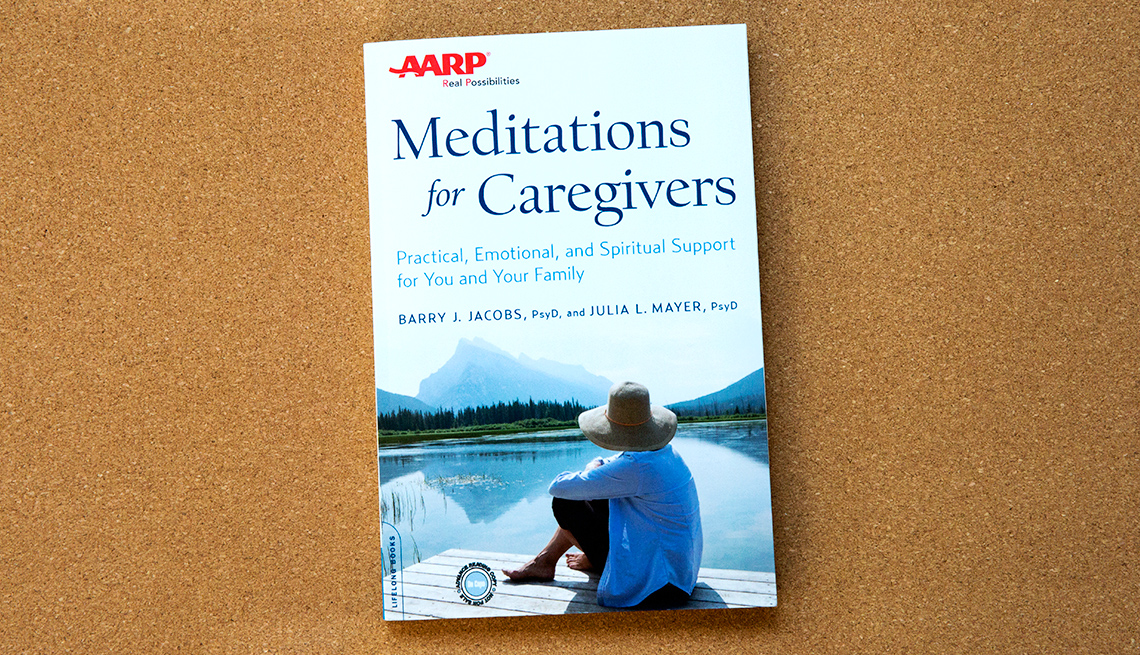Meditations for Caregivers: Practical, Emotional, and Spiritual Support for You and Your Family
By Barry J. Jacobs Psy.D., Julia L. Mayer Psy.D.
Family caregiving has its challenges: emotional overload, time constraints, anxiety, burnout, missed work, adult sibling conflicts and marital issues. But caregivers also grow personally and spiritually by providing care to a loved one. In Meditations for Caregivers: Practical, Emotional, and Spiritual Support for You and Your Family, clinical psychologists Barry J. Jacobs and Julia L. Mayer blend emotional and spiritual motivation to maximize the gains of caregiving while minimizing the strains. The book helps readers view their caregiving as a mission from the heart, complete with sections on accepting your feelings, embracing rewards, seeking support and managing stress. Each page offers an anecdote drawn from the authors’ personal or clinical experience, inspiration and solace, and direct psychological or hands-on advice to foster coping and life satisfaction.
Guided Meditations
Meditations for Caregivers co-author Julie Mayer offers five short guided meditations to relieve stress and stay calm and focused.
2-Minute Guided Breathing: Try this meditation when you have just a few minutes and want to feel more focused, centered and relaxed.
2-Minute Affirmations: Quiet those negative voices many of us hear in our heads and increase your feelings of self-worth. View Video
5-Minute Body-Scan Relaxation: Relax your body and calm your mind so you feel refreshed, focused, and at peace. View Video
5-Minute Guided Imagery – The Beach: Whenever you have a few minutes, wherever you are, be transported to a peaceful place where you feel relaxed and calm. View Video
10-Minute Guided Imagery – The Garden: Let this guided imagery take you to a relaxing spot, providing relief and rejuvenation for mind and body. View Video
Praise for Meditations for Caregivers
“This book will help caregivers find their own way to a place of calm and purposefulness.”
— Carol Levine, director, Families and Health Care Project, United Hospital Fund and author of Planning for Long-Term Care for Dummies
“This book is truly a bible for caregivers.”
— Marc Silver, author of Breast Cancer Husband: How to Help Your Wife (And Yourself) Through Diagnosis, Treatment, and Beyond
"AARP Meditations for Caregivers is filled with stories of hope, perseverance and even transcendence. Drawing from their personal experience as well as others', Drs. Jacobs and Mayer remind us that providing care for a loved one can be a sacred, moral and enriching endeavor."
— Katy Butler, author of Knocking on Heaven’s Door—The Path to a Better Way of Death
About the Authors
Barry J. Jacobs, Psy.D., is a clinical psychologist, family therapist and the author of the book The Emotional Survival Guide for Caregivers: Looking After Yourself and Your Family While Helping an Aging Parent. Dr. Jacobs has given more than 400 local, regional and national presentations on family caregiving for family caregivers and community groups, mental health/social service professionals and physicians/nurses. Since 2008, he has been the national spokesperson on family caregiving for the American Heart Association/American Stroke Association. He is on the expert panel for the Caregiver Crisis Great Challenge for TEDMED.com, an honorary board member of the Well Spouse Association and a past board member of the Collaborative Family Healthcare Association. He is on the expert panel for the AARP Advisory Panel and writes a monthly caregiving column for AARP.org. As a clinician, Dr. Jacobs specializes in helping individuals and families cope with serious and chronic medical illnesses. As an educator, he works as the director of Behavioral Sciences for the Crozer-Keystone Family Medicine Residency Program in Springfield, Pa., and has had adjunct faculty positions with the Temple University School of Medicine, the University of Pennsylvania School of Nursing and the Department of Psychology of the Philadelphia College of Osteopathic Medicine.
Follow Dr. Jacobs @drbarryjjacobs
Julie L. Mayer, Psy.D., a clinical psychologist, has been doing individual and couples therapy for almost 25 years. She is the author of the novel A Fleeting State of Mind. Dr. Mayer has a private practice is in Media, Pa., where she specializes in women's issues, including caregiving and other relationship concerns. She has held adjunct teaching positions at the Institute for Graduate Clinical Psychology of Widener University and in Widener University's undergraduate programs. She was also an instructor for the Master's Program in Creative Arts Therapy at Hahnemann University for eight years, teaching courses on human development and psychoanalytic theory.
Dr. Jacobs and Dr. Mayer, who are married, previously wrote online columns of psychological advice for WebMD and HealthCentral.com. They live in Swarthmore, Pa.

